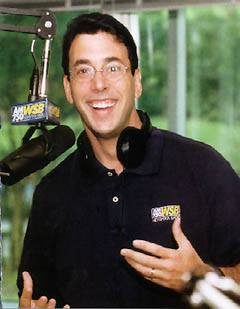

|
|
|
|
||||
|
The Season decided to stop speculating about how to be a millionaire and consult someone who knows – Atlanta's favorite penny pincher Clark Howard. The real secret to building long-term wealth, says the celebrated consumer advocate and syndicated WSB Radio talk show host, is basic. Put money aside, regularly. "The biggest problem we have in this country is that people are determined to spend every penny they make," Clark says. "Your first two goals should be to spend less than you make and start saving. Where you put money really isn't as critical as just putting it aside." Clark, of course, does have some thoughts on how to get started. "The reality is that, left up to us, most won't save, which is why forced retirement funds are so good." He recommends matching your employer's contribution to your 401K plan. This money is tax-deferred which helps out on April 15; but don't forget, taxes are due when the money is withdrawn. Additionally, Clark advises opening a ROTH IRA, a retirement fund in which the contributions are taxed but the earnings are tax-free. There is no income tax deduction the year the contribution is made. A maximum contribution of $2,000 is allowed. (Congress is considering a bill to raise the limit to $5,000). And then there's the stock market, tricky and temperamental though it is. "Keep it simple," Clark says. He recommends six funds – mostly index funds – that are listed on his Web site. Beyond that, he suggests mutual funds or Series I Savings Bonds (the bonds are guaranteed to beat the rate of inflation). Bottom line: "Decide if you are into race horses or work horses," he says. "Stick with mutual funds or index funds and maybe buy some individual stocks for fun, but don't bet the entire house on those individual stocks!" |
|
|||||
|
MONEY SAVERS CLOTHES: All clothes are made these days by jobbers who create the clothes for designers and department stores alike, then put a label on the garments. So buy off-brands, which can be just as good as designer labels. There is no need to pay so much for clothes. You can dress like a million bucks with off brands. DISCOUNT STORES: In a discount store, like Sam's Club or Costco, buy only what you can carry. You are less likely to buy on impulse. GROCERIES: In the grocery store, buy store brands - you can cut your bill by 25 percent. Coupons are okay but may encourage you to buy something you don't need. And never go grocery shopping hungry. DINING OUT: When eating out, remember that liquor and desserts make the most profit for the restaurant. ENTERTAINMENT: If you like sports events or concerts but find the tickets too high, buy them outside the arena, but not from scalpers. There are corporate types who have unused tickets they would like compensation for. However, you have to risk missing the event if you don't find tickets. TRAVEL:
Look for sales. Buy a ticket that's on sale and then figure out
why you want to go to that destination. |
||||||
|
What about credit cards – those priceless little pieces of plastic that have indebted sixty percent of Americans? Clark isn't against them, but he does suggest looking at them as a payment system. "Discipline yourself," he says. "And don't carry a balance. If you have a balance, put your charge card in a baggie, fill it with water and place it in the freezer!" Don't panic. Once the debt is paid off, you can take out the card and use it again – or not. "Maybe during the process of thawing, you'll decide you don't really need to use it," he says. As for all those department store cards? Chuck them, Clark advises, along with all the stores' promotional flyers that can trigger impulse buying. Real estate is another potential money-maker. With the new tax codes, Clark says, you can sell your home every 24 months with no capital gains tax. You actually have to move in and live there, but if you are willing to move every two years, you can buy a fixer-upper, put a little sweat equity into it and make some money. "Flipping real estate every 24 months can make money," he says. "But the limit for profit is $250,000 for an individual and $500,000 for a couple." We can handle that, Clark! As for the expense of cars – and the debate over buying or leasing, Clark recommends buying a car, and a used one at that, with a down payment as large as possible. "Lease returns are depressing the value of used cars, so you can get a really good deal," he says. Hire a diagnostic mechanic to check out the vehicle first, he advises. And, for regular maintenance and repairs, find an independent mechanic who specializes in the vehicle brand, rather than taking it to the dealer. In the quest to spend less than you make and accumulate wealth, Clark insists on the "closet test." Get ready, ladies, this is a tough one. "Go through all your closets and don't forget the attic and basement," says Clark, in that knowing voice of one who has done this himself. "Look at how many things you have bought that you don't use and don't need. Give that stuff away or have a garage sale – and then change your behavior!" That's really what Clark's message is about – changing your behavior. The key to finding wealth in your life is changing your thought processes and ditching bad habits. Need more reinforcement? Log on to www.clarkhoward.com and invest in "Get Clark Smart: the Ultimate Guide for the Savvy Consumer." You may not become a millionaire, but you'll certainly have more money. From the Winter 2000 issue. |
||||||

 How
do people get rich? Well, let's see. You can inherit money from
your family...or win the lottery. Maybe there's a personal injury
lawsuit in your future. Oops, bad idea – that involves a personal
injury. The stock market is a veritable gold mine, but only if you
know where to dig. You can always marry money. Ha! Push comes to
shove, you can head to Hollywood and become a screen star like hometown
gal Julia Roberts. Yeah, right.
How
do people get rich? Well, let's see. You can inherit money from
your family...or win the lottery. Maybe there's a personal injury
lawsuit in your future. Oops, bad idea – that involves a personal
injury. The stock market is a veritable gold mine, but only if you
know where to dig. You can always marry money. Ha! Push comes to
shove, you can head to Hollywood and become a screen star like hometown
gal Julia Roberts. Yeah, right.